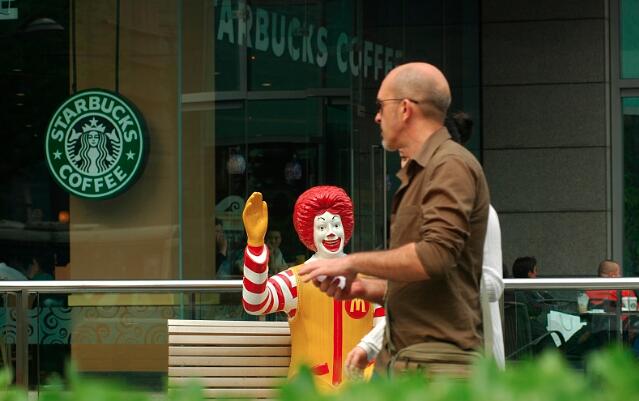 Starbucks said the move is expected to reduce the use of about 1 billion plastic straws a year.
Starbucks said the move is expected to reduce the use of about 1 billion plastic straws a year.Key words: Zhejiang straw | paper straw | environmental protection paper straw | degradable straw | PLA straw | beverage straw | art straw manufacturer | Yiwu Monte daily necessities Co., Ltd
McDonald's, as a global fast food giant, is also duty bound to protect the environment. At the beginning of this year, McDonald's promised to make 50% of food packaging recyclable by 2025. In June this year, McDonald's announced that it would completely stop the use of plastic straws in all restaurants in the UK and Ireland and replace them with paper straws (paper straws for short) from September this year.
It sounds ironic that fast food giants take the lead in promoting environmental protection. On the one hand, the giants may really know that the greater the power, the greater the responsibility. On the other hand, it is also because they are under pressure from governments and major environmental protection organizations around the world.
Some environmental organizations have previously called Starbucks "cup monster". According to the statistics of the international coffee organization, about 600 billion paper cups and plastics are consumed worldwide every year, of which Starbucks cups account for about 1%, that is, 60 million cups.
It is worth noting that Starbucks' plan to stop using plastic straws began in Seattle and Vancouver. The reason is that from the 1st of this month, Seattle, the United States, began to completely prohibit catering operators from providing plastic straws and plastic knives and forks, and encourage the use of reusable tableware or compostable plastic products.
In other parts of the world, various plastic restrictions also emerge one after another. A month before Starbucks announced the plan to stop using plastic straws, Maharashtra, the second largest state in India with a population of more than 100 million, announced that the plastic ban issued in March this year came into force. At the weekend of the ban, 10 companies were fined, including Starbucks and McDonald's. Earlier, Indian Prime Minister modi also said that by 2020, India will eliminate all disposable plastics. Therefore, the environmental protection actions of Starbucks and McDonald's are helpless.
In addition, the environmental protection improvement of food packaging has always faced a practical problem. The cup is recyclable, but it doesn't mean that it can be recycled in the end.
In fact, the plastic cups currently used by McDonald's, the polyethylene coated paper cups for soft drinks, and the paper and plastic cups of Starbucks coffee and xingbingle are technically recyclable, but when they finally become a "symbolic environmental protection" existence.
"There is a lack of a unified standard for recycling. In some places, it is managed by cities, while others are operated by private profit-making companies. This means that some people have the ability or willingness to classify and transform the packaging - such as polyethylene coated paper cups, and some are not. For example, straw is too light to be classified on the recycling production line, so it is thrown into the landfill, and then compared For example, most recycling facilities use automatic sorting equipment and cannot recognize black plastics. Said Bridget Crooke, vice president of external affairs at closed loop partners.
Therefore, the purpose of the NextGen Cup Challenge organized by Starbucks and McDonald's is to create a packaging that meets the recycling regulations of various regions, and rely on the strength of allies to promote the environmental protection of packaging into the mainstream.
As Colleen Chapman, vice president of global social impact for sustainable development at Starbucks, said, "we have been doing it alone for some time, but we are tired of gradualism."
The reason for McDonald's to put aside the concerns of competitors and join in is the same. "In some things, we are not competitors. Food safety is a typical example. We must come up with solutions to ensure that we pay attention to the interests of the public. In environmental protection, we can also use our collective scale to play a role." Marion gross, supply chain director of McDonald's in the United States, said.
McDonald's, as a global fast food giant, is also duty bound to protect the environment. At the beginning of this year, McDonald's promised to make 50% of food packaging recyclable by 2025. In June this year, McDonald's announced that it would completely stop the use of plastic straws in all restaurants in the UK and Ireland and replace them with paper straws (paper straws for short) from September this year.
It sounds ironic that fast food giants take the lead in promoting environmental protection. On the one hand, the giants may really know that the greater the power, the greater the responsibility. On the other hand, it is also because they are under pressure from governments and major environmental protection organizations around the world.
Some environmental organizations have previously called Starbucks "cup monster". According to the statistics of the international coffee organization, about 600 billion paper cups and plastics are consumed worldwide every year, of which Starbucks cups account for about 1%, that is, 60 million cups.
It is worth noting that Starbucks' plan to stop using plastic straws began in Seattle and Vancouver. The reason is that from the 1st of this month, Seattle, the United States, began to completely prohibit catering operators from providing plastic straws and plastic knives and forks, and encourage the use of reusable tableware or compostable plastic products.
In other parts of the world, various plastic restrictions also emerge one after another. A month before Starbucks announced the plan to stop using plastic straws, Maharashtra, the second largest state in India with a population of more than 100 million, announced that the plastic ban issued in March this year came into force. At the weekend of the ban, 10 companies were fined, including Starbucks and McDonald's. Earlier, Indian Prime Minister modi also said that by 2020, India will eliminate all disposable plastics. Therefore, the environmental protection actions of Starbucks and McDonald's are helpless.
In addition, the environmental protection improvement of food packaging has always faced a practical problem. The cup is recyclable, but it doesn't mean that it can be recycled in the end.
In fact, the plastic cups currently used by McDonald's, the polyethylene coated paper cups for soft drinks, and the paper and plastic cups of Starbucks coffee and xingbingle are technically recyclable, but when they finally become a "symbolic environmental protection" existence.
"There is a lack of a unified standard for recycling. In some places, it is managed by cities, while others are operated by private profit-making companies. This means that some people have the ability or willingness to classify and transform the packaging - such as polyethylene coated paper cups, and some are not. For example, straw is too light to be classified on the recycling production line, so it is thrown into the landfill, and then compared For example, most recycling facilities use automatic sorting equipment and cannot recognize black plastics. Said Bridget Crooke, vice president of external affairs at closed loop partners.
Therefore, the purpose of the NextGen Cup Challenge organized by Starbucks and McDonald's is to create a packaging that meets the recycling regulations of various regions, and rely on the strength of allies to promote the environmental protection of packaging into the mainstream.
As Colleen Chapman, vice president of global social impact for sustainable development at Starbucks, said, "we have been doing it alone for some time, but we are tired of gradualism."
The reason for McDonald's to put aside the concerns of competitors and join in is the same. "In some things, we are not competitors. Food safety is a typical example. We must come up with solutions to ensure that we pay attention to the interests of the public. In environmental protection, we can also use our collective scale to play a role." Marion gross, supply chain director of McDonald's in the United States, said.




